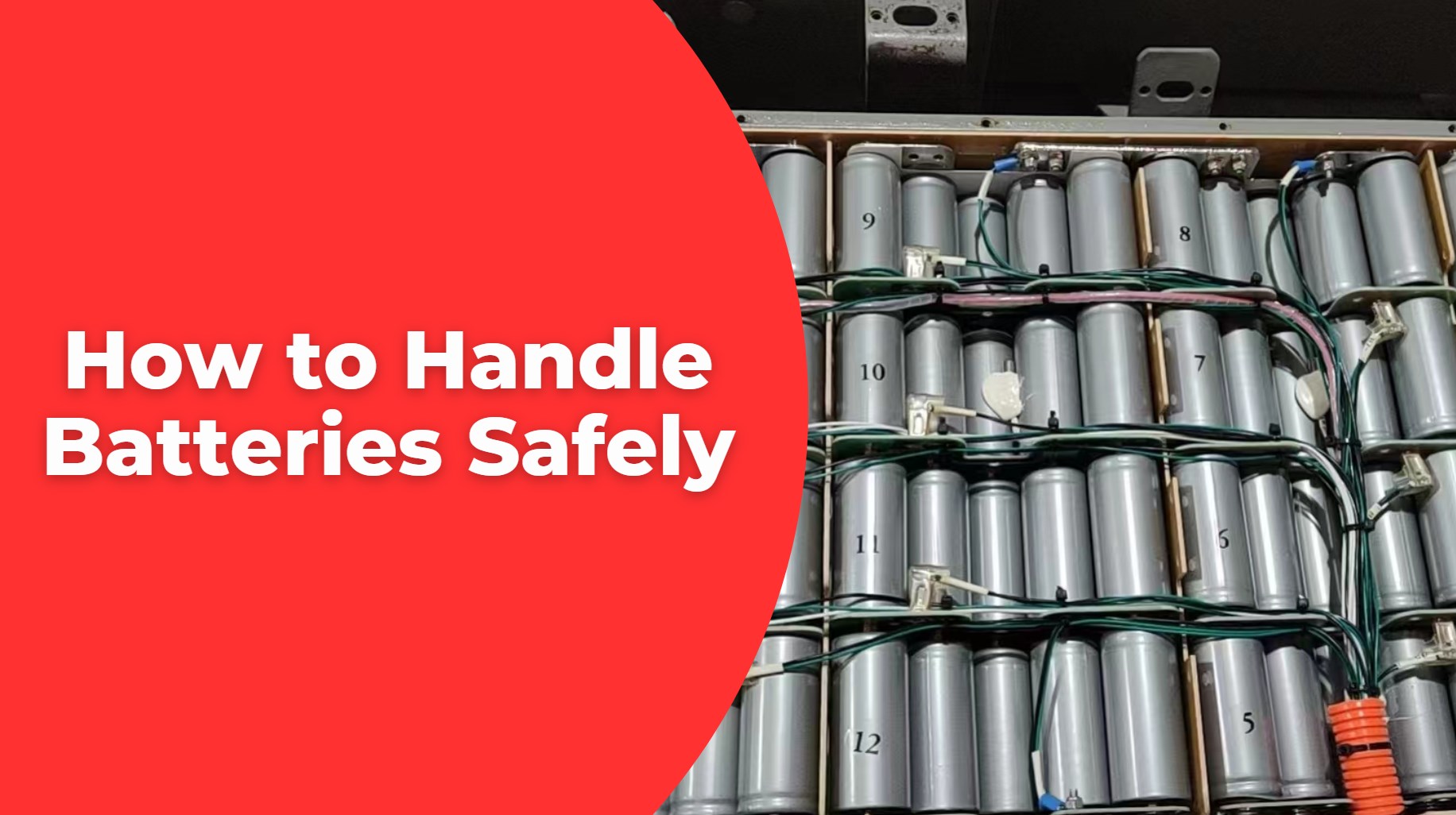Proper handling of batteries is crucial not only for maintaining their performance but also for ensuring the safety of users and the environment. As we navigate the complexities of battery management, adhering to safety guidelines becomes paramount. In this guide, we will delve into the essential precautions and best practices for handling batteries effectively and safely.
To handle batteries safely, avoid letting metal objects touch terminals simultaneously to prevent short circuits. Always wear protective gear like gloves and goggles, store batteries in a cool, dry place away from heat, and use proper lifting techniques for heavy batteries. These precautions help ensure safe handling and storage of batteries
Understanding Battery Basics
Before diving into safety measures, it’s essential to understand the fundamental aspects of batteries. Batteries are energy storage devices that convert chemical energy into electrical energy through electrochemical reactions. They come in various types, including lead-acid, lithium-ion, and nickel-cadmium, each with its own unique properties and safety requirements.
Handling Batteries with Care
1. Always Store Batteries Upright
Storing batteries upright is vital to prevent leaks and spills, especially for lead-acid batteries. When batteries are stored on their sides or upside down, the risk of acid leakage increases, which can lead to hazardous conditions. Ensure that batteries are placed on a stable surface where they will remain upright and secure.
2. Never Overfill with Acid
For lead-acid batteries, overfilling with acid can cause overflow and potential damage. Always adhere to the manufacturer’s recommended acid levels. Overfilling can lead to acid spillage, which poses a significant safety risk and can damage the battery and surrounding surfaces.
3. Avoid Allowing Children Access
Batteries, particularly those with hazardous materials, should be kept out of reach of children. Battery acid and other chemicals can be harmful if ingested or if they come into contact with skin. Store batteries in secure, child-proof locations to prevent accidental exposure.
Charging and Ventilation
4. Charge in a Well-Ventilated Area
Charging batteries, especially those like lead-acid or lithium-ion, should always be done in a well-ventilated area. During charging, gases such as hydrogen may be released, which can be explosive if accumulated in a confined space. Ensure proper airflow to mitigate any potential risks.
5. Never Block Battery Vents
Battery vents are designed to release gases that build up during charging or discharging. Blocked vents can cause pressure to build up inside the battery, leading to potential rupture or explosion. Keep vents clear of obstructions to ensure safe operation.
Protective Measures
6. Wear Eye Protection
Eye protection is essential when handling or charging batteries. Batteries can release acid or other chemicals, which can cause serious eye injuries. Always wear safety goggles or glasses to protect your eyes from potential splashes or fumes.
7. Use Protective Clothing
When handling batteries, especially when dealing with acidic or corrosive types like lead-acid, it’s advisable to wear protective clothing. This includes gloves and aprons to shield your skin from harmful chemicals. Protective gear minimizes the risk of chemical burns or other injuries.
Proper Battery Storage
8. Store Batteries in a Cool, Dry Place
Batteries should be stored in a cool, dry location to prevent degradation. Excessive heat or humidity can adversely affect battery performance and lifespan. Aim for storage environments with controlled temperatures and low humidity to maintain battery integrity.
9. Separate Different Battery Types
Different types of batteries should be stored separately to avoid cross-contamination and short-circuiting. For example, lithium-ion and alkaline batteries should not be mixed together. Proper segregation helps prevent safety hazards and ensures proper handling.
Disposal and Recycling
10. Follow Local Disposal Regulations
When batteries reach the end of their life, proper disposal is critical. Follow local disposal regulations to ensure batteries are discarded safely. Many regions have specific guidelines for battery recycling, particularly for hazardous types like lead-acid or lithium-ion.
11. Utilize Battery Recycling Programs
Participating in battery recycling programs helps manage the environmental impact of discarded batteries. Many manufacturers and retailers offer recycling services to safely process old batteries. Always use these programs to ensure responsible disposal and minimize environmental harm.
Battery Maintenance and Safety Checks
12. Regularly Inspect Batteries
Routine inspection of batteries is essential for identifying any potential issues before they become serious. Check for signs of corrosion, leaks, or physical damage. Early detection can prevent accidents and extend the life of your batteries.
13. Keep Battery Terminals Clean
Clean battery terminals regularly to ensure good electrical contact and prevent corrosion. Corroded terminals can lead to poor performance and potential safety hazards. Use a dry cloth or a suitable cleaning solution to maintain terminal cleanliness.
Battery Health Optimization
14. Avoid Deep Discharges
For rechargeable batteries, such as lithium-ion or nickel-cadmium, avoid deep discharges. Frequently depleting the battery to very low levels can shorten its lifespan. Charge batteries before they reach critically low levels to maintain optimal performance.
15. Follow Manufacturer’s Guidelines
Always adhere to the manufacturer’s guidelines for battery use, maintenance, and charging. Each battery type has specific requirements and best practices. Following these instructions ensures safe operation and maximizes battery longevity.
Conclusion
Adhering to proper battery handling and safety practices is vital for both performance and safety. By storing batteries correctly, charging in well-ventilated areas, and using appropriate protective measures, you can enhance battery longevity and ensure a safer environment. Additionally, responsible disposal and recycling contribute to environmental sustainability.
For those seeking high-quality battery solutions and expert advice, Redway Battery offers top-notch portable power solutions. Contact them today for a personalized quote and experience their commitment to superior battery performance and safety.



